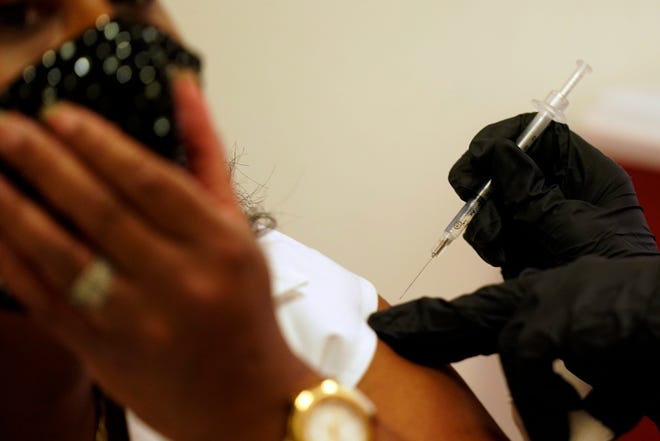

COLUMBUS – During the COVID-19 pandemic, essential workers stocked shelves with food, cleaned classrooms and treated patients at home.
Now they deserve a raise, Democratic lawmakers say.
The push to increase the minimum wage to $15 isn't new, but its chances of passing might be – at least at the federal level.
President Joe Biden recently proposed increasing the federal minimum wage to $15 an hour as part of his $1.9 trillion COVID-19 relief package, fulfilling a campaign promise. But passing it will be no easy feat in a divided U.S. Senate.
The federal proposal, backed by Vermont Sen. Bernie Sanders and Ohio Sen. Sherrod Brown, would gradually increase the minimum wage from $7.25 an hour to $15 an hour by 2025.
The plan would also eliminate lower wages for tipped workers, those younger than 20 during their first months on the job and individuals with disabilities in workshops.
“For too many people in this country, hard work isn’t paying off,” Brown said. “While costs for Ohio families are rising and workers are more productive than ever, wages aren’t keeping up."
The effort has a better shot at the federal level, where Democrats control which legislation passes, than in Ohio's GOP-controlled Legislature, said Greg Lawson, a research fellow at the conservative Buckeye Institute.
In Ohio, Democratic state lawmakers proposed another way to increase the minimum wage to $15 an hour, inching it up by $1 an hour through 2027. Legislators modeled the language off a Florida ballot initiative, which passed with 60% of the vote in November.
Why raise the minimum wage?
The last time Ohioans voted to increase the minimum wage was in 2006 after efforts to raise the wage through the state's GOP-controlled Legislature failed. Issue 2 passed with 56.7% of the vote, increasing the state's minimum wage from $5.15 to $6.85 an hour and tying annual increases to inflation.
Those raises – just 10 cents between 2020 and 2021 – aren't enough anymore, said Rep. Brigid Kelly, D-Hyde Park, who introduced a bill with Rep. Dontavius Jarrells, D-Columbus.
"People are working harder than ever but their wages are staying the same," Kelly said.
Since 1979, productivity has risen six times faster than hourly compensation for the typical U.S. worker, according to a 2019 analysis from the pro-union Economic Policy Institute.
About 2 million Ohio workers, 37% of the state's workforce, would benefit from a $15 minimum wage either because they currently make less than $15 an hour or they earn just above it, according to a 2019 report from Policy Matters Ohio, a left-leaning think tank.
"If we can lift people up out of poverty and give them the ability to look ahead, that goes a long way and benefits the state of Ohio in general," said Sen. Cecil Thomas, D-North Avondale. He is introducing a companion bill in the Ohio Senate with Sen. Hearcel Craig, D-Columbus.
Low-wage workers are more likely to spend that new money on groceries, bills and other expenses that stimulate the state's economy. That happened when unemployed workers received an extra $600 per week from the federal stimulus package during the COVID-19 crisis, according to JPMorgan Chase Institute research.
Unintended consequences?
Opponents of raising the minimum wage say the move will have unintended consequences, such as higher prices on products, fewer entry-level jobs and shuttered small businesses.
"You’re going to help some people, yeah, but you’re going to unintentionally hurt other people," Lawson said.
While companies like Target, Amazon and Starbucks have committed to increasing their wages to $15 an hour, smaller businesses might not be able to take the hit, especially amid COVID-19 restrictions, Lawson said.
Businesses could pass the cost onto customers, too, he said.
That's fine with Thomas: "I would happily pay $8 for a Happy Meal if I can get someone to a $15 minimum wage."
But these arguments have stymied past efforts to increase the state's minimum wage. Ohio's GOP-controlled Legislature held just one hearing on Kelly's bill during the last two-year session.
Will that change in 2021?
It's all about political will, said Kelly, adding it depends on "whether this is something that elected officials view as important for their constituents and for their state’s economy."
"This is important for people who go to work and work hard every day."
Source link







